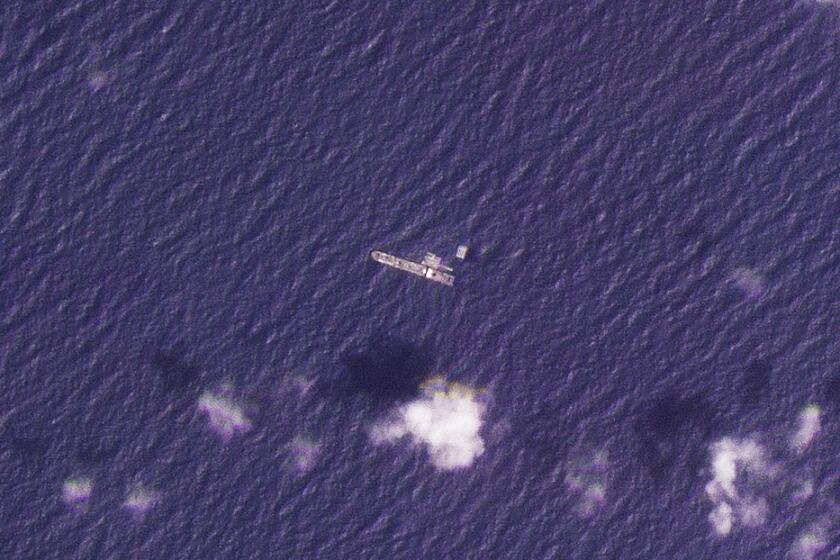Putin raises new options for U.S. missile system
As President Bush on Friday received an endorsement in Poland for placing missile interceptors there, Russian President Vladimir V. Putin presented a second alternative in two days for where the U.S. should install the missile defense system.
The Russian president, speaking at a news conference at the end of the Group of 8 summit, said the interceptors could be located in Turkey, or perhaps in Iraq or at sea. A day earlier, he caught U.S. officials by surprise in suggesting that an existing Russian-run radar system in Azerbaijan be used to protect Europe from a possible attack by Iran. Bush has been planning to build a new radar facility in the Czech Republic.
The missile defense debate has colored the U.S.-Russian relationship for weeks, with Putin contending that the system envisaged by Washington would be considered a threat to Russia and could force him to retarget Russian missiles toward Europe.
The U.S. has said the system would remain defensive in nature and was intended only to protect Europe from a possible Iranian attack of still-to-be- developed long-range missiles.
Bush, spending less than four hours in Poland, nearly all of the time with Polish President Lech Kaczynski at Kaczynski’s official retreat on a peninsula in the Baltic Sea, showed no sign of wavering from his plan to base 10 interceptors in Poland.
Kaczynski, answering one of Putin’s original complaints about the weapons, said the system, to be targeted at Iran, would have “no aggressive” element but would protect Europe.
“The Russian Federation can feel totally safe,” the Polish president said, with Bush at his side in a Gdansk airplane hangar after their conference ended.
On a day in which a stomach ailment forced him to skip the morning meetings at the end of the G-8 summit in Germany, Bush traversed the European continent from north to south before ending the day here.
In Poland, Bush said “the system we have proposed is not directed at Russia. We would welcome Russian cooperation.”
After meeting Thursday with Bush, Putin told reporters that a radar system in Azerbaijan would allow the destruction of missiles over open water.
U.S. officials said only that it was a “bold” proposal and that they would study it. When he made the proposal, Putin also accepted Bush’s invitation to set up meetings of top military officers and diplomats to consider such joint efforts.
Secretary of State Condoleezza Rice scoffed at Putin’s idea for an alternative to Poland as the base for the interceptors, saying Friday in an interview with the Associated Press: “One does not choose sites for missile defense out of the blue.”
Gordon Johndroe, spokesman for the National Security Council, said the issue was complex.
“We will be discussing various aspects of it with the Russians and others over coming weeks and months, and we will continue to look at all the options presented,” he said.
Bush and Putin, who met for 45 minutes at the summit in the eastern German resort of Heiligendamm on the Baltic Sea, are planning to get together for two days of talks in July at Bush’s father’s compound in Kennebunkport, Maine.
Arriving in Rome for a 32-hour visit, Bush was greeted by headlines in the newspaper Libero that read “Welcome Bush,” in English, and then in Italian: “But Prodi & Co. Hate You.”
The reference was to Prime Minister Romano Prodi. It was perhaps overstated, but Italians overwhelmingly oppose the war in Iraq, and Prodi has moved Italy from the staunch pro-American policies of his predecessor, Silvio Berlusconi.
The threat of possibly violent demonstrations and other security concerns forced Bush to abandon plans to visit a church today in the Trastevere neighborhood and the headquarters of the Community of Sant’Egidio, a Roman Catholic lay organization involved in peace negotiations and humanitarian efforts in Africa.
Bush spent Friday morning in his private quarters at the Kempinski Grand Hotel in Heiligendamm. He managed to meet there with the new French president, Nicolas Sarkozy, before bowing out of summit business in the morning due to illness.
He recovered sufficiently to attend a summit-ending luncheon, and later responded, “Fine, thanks,” when asked by reporters how he felt.
But in Poland, delivering a statement with Kaczynski after their meeting, he spoke without much lift in his voice.
Referring to the time Bush’s father became ill at an official dinner in Japan in 1992, White House counselor Dan Bartlett said of the decision to skip the summit sessions: “I guess he didn’t want to follow in the footsteps of his father in Asia.”
Bartlett said Bush felt well enough when he awoke to get dressed for the day, but soon realized he was not well enough to leave his quarters.
He said Richard Tubb, the White House physician who travels at Bush’s side, monitored the president during the morning.
Bush set out on the trip Monday, flying that day to Prague. On Tuesday evening he flew to Germany, and on Wednesday found time for a bike ride.
Times staff writer Tracy Wilkinson contributed to this report.
More to Read
Start your day right
Sign up for Essential California for news, features and recommendations from the L.A. Times and beyond in your inbox six days a week.
You may occasionally receive promotional content from the Los Angeles Times.






